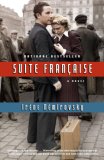Summary | Excerpt | Reading Guide | Reviews | Beyond the Book | Read-Alikes | Genres & Themes | Author Bio

Critics' Opinion:
Readers' Opinion:
First Published:
Apr 2006, 416 pages
Paperback:
Apr 2007, 448 pages
 Book Reviewed by:
Book Reviewed by:
BookBrowse Review Team
Buy This Book
Please be aware that this discussion guide will contain spoilers!
About This GuideSUGGESTED READING
The Diary of Anne Frank,
Charlotte Gray by Sebastian Faulks
Birdsong by Sebastian Faulks
The Regeneration Trilogy by Pat Barker
Night by Eli Wiesel
Unless otherwise stated, this discussion guide is reprinted with the permission of Vintage. Any page references refer to a USA edition of the book, usually the trade paperback version, and may vary in other editions.





The Flower Sisters
by Michelle Collins Anderson
From the new Fannie Flagg of the Ozarks, a richly-woven story of family, forgiveness, and reinvention.

The House on Biscayne Bay
by Chanel Cleeton
As death stalks a gothic mansion in Miami, the lives of two women intertwine as the past and present collide.

The Funeral Cryer by Wenyan Lu
Debut novelist Wenyan Lu brings us this witty yet profound story about one woman's midlife reawakening in contemporary rural China.
Your guide toexceptional books
BookBrowse seeks out and recommends the best in contemporary fiction and nonfiction—books that not only engage and entertain but also deepen our understanding of ourselves and the world around us.